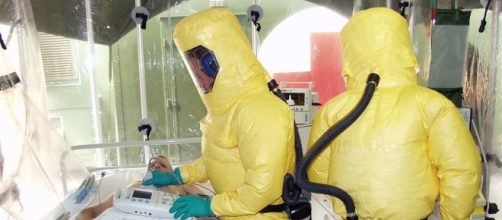Ebola has an ugly way of popping back into the statistics at the moment we dare draw a sigh of relief. The outbreak in West Africa in 2014 caught the world headlines as the disease swept across the countries of Liberia, Guinea, Sierra Leone, Nigeria,and Mali. There were even deaths in the USA which involved people who had been in West Africa.
Just weeks before Sierra Leone was due to celebrate being Ebola free, in Mid-September 2015, a young girl became sick with the disease and 260 people were quarantined.
Last week ending 4 October 2015, the World Heath Organization raised hopes throughout the world when they declared the first week since March 2014, where no Ebola cases had been reported.
This happy state of affairs was turned on its head just a few days later when a Nigerian man died in a hospital in the city of Calabar. Ten of his acquaintances are now under quarantine.
Nigeria had been Ebola free for just over a year. The first outbreak resulted in seven deaths which were far fewer than many other countries, but this latest death is a big blow to the country.
BBC released the breaking news on 8th October that the Scottish nurse, Pauline Cafferkey who had contracted the disease in 2014 but had survived the illness, fell ill with an Ebola related sickness yesterday. Doctors are predicting a good prognosis as she has survived the disease before.
11,312 deaths had occurred up until 4 October.
Now the figure will be standing at 11,313 with the death reported from Nigeria. The latest figures reported by WHO are encouraging as figures have fallen steadily. However, the massive 2014 outbreak was traced back to a single death in December 2013 when a two year old child died from the disease in Guinea.
WHO officials are hoping that the isolated case will not kick-start a new out-break even thought Nigeria is well equipped to deal with the disease.
How is Ebola Transmitted?
The virus is transmitted through contact with body fluids such as blood, vomit and saliva. Family and health care workers are at high risk of infection from the disease. Evan a sneeze can allow the virus to enter a human body through an eye.
The virulent and scary illness requires health care workers to have an incredible dedication to their job.
Will Ebola ever be completely eliminated?
Ebola is thought to be carried by fruit bats, or possibly some species of monkeys. In West Africa, bush meat is a potential source of the infection. Handling and consuming the meat of these dead animals may be what started the human Ebola virus off in the first place.
Despite a ban on hunting for bush meat in Sierra Leone, in March this year Mark Doyle, a BBC reporter witnessed a hunt in action. At the time Bala Amarasakaran, a Sierra Leone-based expert on forest primates and conservation, told the BBC, "I do believe there's a scientific basis for believing the Ebola virus resides in bushmeat."
Bush meat is in such high demand in West Africa that some forests suffer from the Empty Forest Syndrome due to hunting pressure.
Perhaps the best that mankind can hope for if the trend continues,is that experienced and dedicated health teams will be able to contain the disease.

